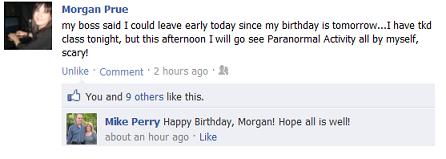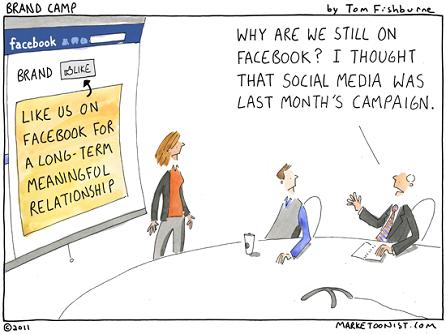 Our Lori Lewis takes a closer look at a recent Inside Radio poll about Facebook and social media. Does she have an opinion about it? Does a chicken have lips?
Our Lori Lewis takes a closer look at a recent Inside Radio poll about Facebook and social media. Does she have an opinion about it? Does a chicken have lips?
Facebook’s mission statement should be understandable for any brand: “To give people the power to share and make the world more open and connected.”
Understanding how people interact on Facebook is simple. They are chatty, they share things – it’s all about them, and the moments of their lives that they enjoy sharing with others:
This is who they are socially – recording their “timelines.” They aren’t especially interested in talking with companies, but if a brand has mastered an engaging social reputation, they’ll treat you like one of their friends and interact with you. And maybe even advocate on your behalf.
That sounds pretty easy (and cool) for radio to participate in, right? After all, we’re chatty media outlets so it almost feels too easy to weave our brands into the fabric of their daily social life.
So, why are so many readers of Inside Radio (presumably radio people) making our industry look dated and disconnected by dissing social networking? This headline jumped out at me last week, along with this excerpt:
Inside Radio Readers Poll: Half say social networks a revenue-building bust
“Facebook is fun and Twitter is a 140-character soapbox but when it comes to making money or contacts, half of Inside Radio readers say social networks haven’t done a thing to advance their career or promote their station.”
Really? Where does it promise this in Facebook’s mission statement? Imagine how radio might react if other industries simply glommed onto their cume audience (with no payments) to make money and build their brands. Who started this notion of “you can make money on Facebook?”
This IR “unscientific poll” is downright embarrassing. Other statements from the article included: “Social networks, however necessary to what we now do, are an incredible time-waster” and as IR concluded, “Lots of people said that while they’re on it, they’re not really sure why — or whether it’s doing much good.”
This article speaks to the lack of understanding of social media profiles by many radio people and it points to a key problem: You can’t measure so-called ROI when you don’t bring value to the audience experience in the first place, and when there’s no defined meaning to what you’re even doing on Facebook in the first place.
Social platforms are some of the greatest gifts ever bestowed on the radio industry. With them, you can:
- Monitor and stay ahead of conversations about your brand and your audience’s lifestyles, and translate what people are saying into opportunities to better connect with them
- Build effective gateways to your station’s website with properly composed posts
- Increase your metrics and brand authority by using social networks to move listeners to your best and most compelling content
- Tap into a whole new league of listeners – those who want a stronger relationship with your radio station, who have the propensity to share your content with their audiences, and would love to become “brand advocates” for higher visibility and more station listening and usage
For Inside Radio readers who call social sites a “time suck,” it’s time to adapt to a multi-channel environment and study the motivations behind each channel. Or simply get left behind in the digi-cultural wave that is undeniably powerful. If radio doesn’t invest the time and energy in social, a steep price will most surely be paid.
It is essential to find the right people – internally and externally – who can assist you in developing and meeting your radio station’s social networking objectives. In the process, it is of utmost importance to create an “umbrella strategy” that merges management, sales and programming to get everyone on the same page, so there are less “random acts of social” and instead, stations focus on strategic activities that can truly help you measure success, build brands, and connect with audiences where they now live – on Facebook.
To take advantage of Lori Lewis’ social media know-how, contact Paul Jacobs.
- A 2020 Lesson?It Could All Be Gone In A Flash - April 24, 2025
- How AI Can Give Radio Personalities More…PERSONALITY - April 23, 2025
- Can Radio Afford To Miss The Short Videos Boat? - April 22, 2025






Some who responded to the Inside Radio poll simply don’t know what they’re missing…and that not everything has a immediate ROI. I’ve met more than a few radio GMs who either still don’t think its worth the time and effort by staff – and see no benefit – or simply feel its a passing fad and will toy with it as long as neccessary, without any real committment or plan.
Then there’s those who are using SM but simply “broadcasting” with no engagement. You can usually tell those on Facebook or Twitter by a flurry of posts – usually at the same time everyday, simply promoting client remotes and the like. No engagement and lots of lost opportunity.
It is amazing how huge Facebook has become with the radio listening audience, and yet so many in radio simply don’t understand why. And that’s in spite of them being on Facebook themselves. People didn’t sign up ‘like” your brand, listen at 2:15 to win tickets, or make you money. They love to hook up with friends and family members. Radio needs to do a better job of understanding the motivations behind why consumer engage with Facebook in the first place, and how to truly interact with their audineces. There IS a learning curve here, and the Inside Radio “study” suggests the industry is still in the first inning when it comes to undertsanding Facebook. Thanks, Dan.
I’m sitting here laughing.
If you take the words Social Media out and replace it with Radio, you get a view of numerous clients that have pissed away money on radio advertising with nothing to show for it.
“Radio is fun … but when it comes to making money or contacts…radio advertising hasn’t done a thing to advance my business or promote my brand.”
How many times have your account reps heard this? And it’s always because of a lack of strategy, execution or understanding of how radio works teamed with an inexperienced rep simply taking the order.
Same applies to Social Media.
. Open your eyes
. Learn the platforms
. Build the right team
. Set the goals and expectations
. Research what your listeners are asking for (not what you think they are)
. Build content that matches those things
. Optimize that content on all platforms
. Distribute it across the channels
. Engage and Measure
. Rinse and repeat
Unfortunatley, there are a lot of stations with one toe in the Social Media water screaming it’s just too cold, while we have seen great progress by numerous others who have jumped in, overcome their fears and figured out how to swim and adapt.
Come on in. Take your floaties off. The water’s fine.
Nathan, great comments & observations here. I think we sometimes see these through the social media lense and miss the point that it’s basic marketing, research, and knowing your customer. And I will most defiinitely not forget to “rinse and repeat.” Thanks for taking the time to contribute to the conversation.
I’d like to ask the folks that don’t see the value of Social Media if they would also recommend turning off the request lines. The request lines are a way for our listeners, our P1’s, to interact with the radio station in a more personal way. They can call the station and have one on one interaction with the radio personality. Social Media is geared toward that type of personal social interaction but on a broader scale. Not only can the listener interact with the jock on the air, but they can interact with the station as an entity and with other like-minded listeners. Let’s see our request lines do that!
Social media must engage the user on a more personal level to be most effective and beneficial. Sales and branding messages are inevitable, and even needed, but they must be communicated in the proper ways and doses. If the marketing message brings real value to the user/listener, then the message won’t be seen as intrusive or spammy. This will provide a definite client benefit.
Radio needs to be better at playing to the strength of social media, starting an interactive dialog with the user. So where is the ROI? It is in generating brand affinity and loyalty by personal interactive conversations with the audience. It’s what radio has been doing on the request lines for decades, but now we use a keyboard instead of the telephone.
Thanks for the good analogy, Kelly. A better feedback loop is just a part of the social media opportunity. And yes, ROI will indeed be measured differently. Perhaps there is a dollars and cents component, but there are other wonderful benefits available to us, too. Hopefully, we’ll be smart and patient enough to unlock the opportunities.
Too many radio folks (and our clients) try to use social space like it’s a transactional space. That’s not what it is. History shows us clearly how to use it if only we take the time to look.
Thanks, Jim. An open mind would be helpful. We are fortunate, as Lori pointed out, that we have this wonderful new tool kit at our disposal.
Somehow TV totally gets it. They see social space as another “screen” to program. They act with as much purpose in that space as they do on their “traditional” space.
https://gigaom.com/video/frank-on-social-media-in-tv-programming/
Thanks, Jeff. TV is enjoying the “real time” aspects of their programming and giving the audience a chance to comment along and enhance the experience – shades of the old “Mystery Science Theater 3000.” Thanks for the comment and the observation.
Bravos, Lori and Fred. Points well-reasoned and well-said. However, given the press of daily affairs driven by priorities set at the top of radio firms, it’s understandable how many local commercial radio operators have come to be characterized as digital laggards. It’s a leadership problem. The failure to seriously embrace and engage social networks is, in my view, a symptom of a much more profound challenge. Social networks are the real deal but they’re only one moving part in the massive, ongoing sea change that is digital disruption. Jill Abramson, executive editor of The New York Times, perhaps said it best, to wit: “…the digital future we used to talk about is now the digital present.”
For those that question the notion of making money with social media, allow me to suggest you need to read something in addition to the radio trade press. The best exemplars of digital can, presently, be found outside of radio. Here’s one example from 2009. Dell set up multiple Twitter accounts with one dedicated to tweeting links to a landing page featuring Dell Outlet coupons. These offers were not promoted or available via any other Dell channel. Dell attributed $13 million dollars in revenue generated over twelve months by this single Twitter promotion. Truth be known if you’re not making money with your digital assets you’re just not trying very hard. We happen to own a single location retail store which we are able to use as a lab. FYI – it has consistently made money on Facebook for years now. The great news is…it’s still the dawn of digital. It should be noted that today over 60% of the small local businesses in the US still do not have a web site. Radio can and should play a collaborative, money making role in that incredible upside opportunity.
We’re all making this stuff up as we go along. Welcome to the world of perpetual beta. The important thing is to get into the game and as the brilliant Jeff Cole is fond of saying “Your learning curve must be much steeper than your action curve. You have to be paying attention, learning and watching.”
Dave, thanks as always for perspective, wit, and leaving us with something to think about. Social media is a brand new set of great toys and tools. The ways in which we experiment and play with them will determine our ability to integrate them into our future. Hopefully, some of the early judging we saw in the Inside Radio article will hopefully be passed by more considered usage of the tools. Thanks again for adding to the conversation.
At it’s root, radio is the original “Social Network”……..
On a certain level, that’s true. But radio has a challenge to learn how to use the new social media tool kit. We have to stop thinking in terms of a financial return, and focus on how to better engage and connect with our audiences. Thanks for chiming in.
Allow me to submit this thought on SM and engagement. We recently conducted a lab study in 2 major and 1 small market. The test group used FB as a way to communicate with the sole intention of driving facebook fans back to a station website and get them to become database members. The purpose was to see if could generate Uniques. Not only did we generate new uniques…but lifted over engagement over 20% for that month which meant that new users were taking more actions on the clients website over the course of a month.
Online is a ‘blue ocean of Cume’. You can take advantage of it or be left behind!
Here’s something else to ponder…in one click of a button your audience can make your brand go viral or put it into a very bad marketing conundrum (see netflix) where do you want to be?
Media companies are the new listeners…start listening or your be out of date very quickly.
Michael, great observations and comments. Radio has to start looking at social differently and the Inside Radio survey was a strong indicator that the industry has a long way to go. Appreciate you taking the time to contribute.